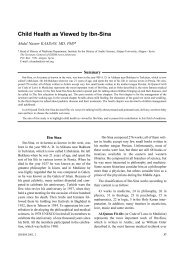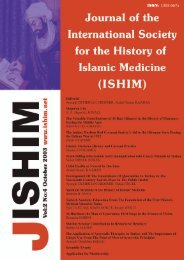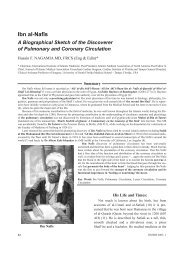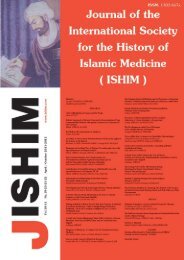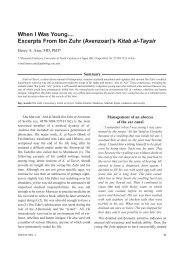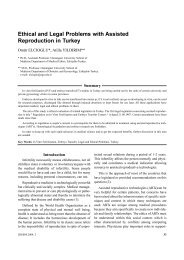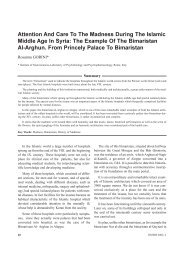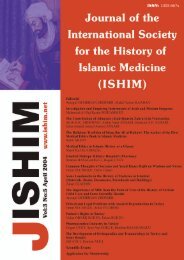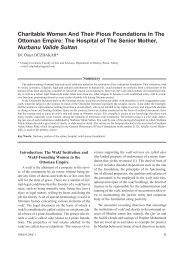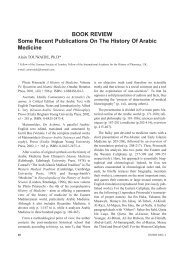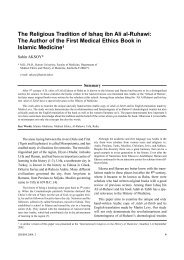A Short History of Islamic Pharmacy - International Society for the ...
A Short History of Islamic Pharmacy - International Society for the ...
A Short History of Islamic Pharmacy - International Society for the ...
Create successful ePaper yourself
Turn your PDF publications into a flip-book with our unique Google optimized e-Paper software.
David W. TSCHANZ<br />
A SHORT HISTORY OF ISLAMIC PHARMACY<br />
<strong>the</strong>re<strong>for</strong>e, was recognized as a provider <strong>of</strong> essential<br />
tools and a separate pr<strong>of</strong>ession with high standards..<br />
One <strong>of</strong> <strong>the</strong> finest definitions <strong>of</strong> <strong>the</strong> pharmacist, his<br />
role and his pr<strong>of</strong>ession, was given by Abu ar-<br />
Rayhan al-Biruni (d.1048). In his work as-<br />
Saydanah fit-Tibb, al-Biruni defined <strong>the</strong> Pharmacist<br />
(as-Saydanani} “as <strong>the</strong> pr<strong>of</strong>essional who is specialized<br />
in <strong>the</strong> collection <strong>of</strong> all drugs, choosing <strong>the</strong> very<br />
best <strong>of</strong> each simple or compound, and in <strong>the</strong> preparation<br />
<strong>of</strong> good remedies from <strong>the</strong>m following <strong>the</strong> most<br />
accurate methods and techniques as recommended by<br />
experts in <strong>the</strong> healing arts.” A description that varies<br />
only slightly from <strong>the</strong> modern one.<br />
Al-Biruni promoted <strong>the</strong> idea <strong>of</strong> academic training<br />
<strong>of</strong> pharmacy students coupled with day-to-day practical<br />
experiences with drugs. As a result, he said <strong>the</strong>se<br />
trainees would become more and more familiar with<br />
<strong>the</strong> shapes, physical properties, and kinds <strong>of</strong> drugs.<br />
They would <strong>the</strong>n be able to differentiate one from <strong>the</strong><br />
o<strong>the</strong>r and would possess <strong>the</strong> know-how, a knowledge<br />
that could not be taken away from <strong>the</strong>m.<br />
He also argued that a pharmacist should also be<br />
able to substitute or to discard one drug <strong>for</strong> ano<strong>the</strong>r.<br />
The knowledge <strong>of</strong> how drugs work on <strong>the</strong> body<br />
(pharmacology), however, is more important than <strong>the</strong><br />
mere skill <strong>of</strong> preparing <strong>the</strong>m, he said. In substituting<br />
one drug <strong>for</strong> ano<strong>the</strong>r <strong>the</strong> various actions <strong>of</strong> each<br />
should be considered and accounted <strong>for</strong>. Cure can be<br />
sought through a draft, ointment, anointing oils, or by<br />
fumigation. Thus, in seeking a substitute, all <strong>the</strong>se<br />
and o<strong>the</strong>r applications should be considered. Without<br />
this knowledge one falls short <strong>of</strong> pr<strong>of</strong>essional goals.<br />
Ibn Sina and Clinical Trials<br />
Discussing Ibn Sina is like describing a <strong>for</strong>ce <strong>of</strong><br />
nature. In <strong>the</strong> area <strong>of</strong> pharmacy he made many contributions,<br />
including describing 760 drugs. Perhaps his<br />
most lasting in <strong>the</strong> field <strong>of</strong> pharmacy was his work in<br />
laying down <strong>the</strong> following rules <strong>for</strong> testing <strong>the</strong> effectiveness<br />
<strong>of</strong> a new drug or medication. These principles<br />
still <strong>for</strong>m <strong>the</strong> basis <strong>of</strong> modern clinical drug trials.<br />
1. The drug must be free from any extraneous accidental<br />
quality.<br />
2. It must be used on a simple, not a composite, disease.<br />
3. The drug must be tested with two contrary types<br />
<strong>of</strong> diseases, because sometimes a drug cures one<br />
disease by its essential qualities and ano<strong>the</strong>r by its<br />
accidental ones.<br />
4. The quality <strong>of</strong> <strong>the</strong> drug must correspond to <strong>the</strong><br />
strength <strong>of</strong> <strong>the</strong> disease. For example, <strong>the</strong>re are<br />
some drugs whose heat is less than <strong>the</strong> coldness <strong>of</strong><br />
certain diseases, so that <strong>the</strong>y would have no effect<br />
on <strong>the</strong>m.<br />
5. The time <strong>of</strong> action must be observed, so that<br />
essence and action are not confused.<br />
6. The effect <strong>of</strong> <strong>the</strong> drug must be seen to occur constantly<br />
or in many cases, <strong>for</strong> if this did not happen,<br />
it was an accidental effect.<br />
7. The experimentation must be done with <strong>the</strong><br />
human body, <strong>for</strong> testing a drug on a lion or a horse<br />
might not prove anything about its effect on man.<br />
Maturity<br />
Ano<strong>the</strong>r <strong>the</strong>me <strong>of</strong> pharmaceutical interest that<br />
continued to draw attention during <strong>the</strong> eleventh century<br />
was toxicology. A good example is al-Munqidh,<br />
by al-Husayn b. al-Mubarak, completed about<br />
483/1091, and dedicated to <strong>the</strong> wazir al- Mufaddal b.<br />
Abi al-Barakat in San'a, Yemen.<br />
Ibn al-Mubarak explained that <strong>the</strong>re were two<br />
dangers to avoid at all costs. One, spiritual, meant<br />
getting rid <strong>of</strong> hatred, envy, malice, and <strong>the</strong> like. In so<br />
doing one avoided troubles and illness , <strong>for</strong> <strong>the</strong> body<br />
and <strong>the</strong> soul. The second danger was related to poisons<br />
that are fatal to <strong>the</strong> body in <strong>the</strong> shortest possible<br />
time. Poisons are hidden weapon in <strong>the</strong> hands <strong>of</strong> enemies<br />
to take revenge and to kill.<br />
Ibn al-Mubarak was concerned with <strong>the</strong> safety<br />
<strong>of</strong>, his sponsor, <strong>the</strong> wazir al-Mufaddal, who was<br />
always exposed to servants and ministers, and decided<br />
to write a book on poisons and poisoning in foods,<br />
drinks, and things that could be smelled, such as<br />
flowers. He also made a study <strong>of</strong> antidotes, many <strong>of</strong><br />
which he copied from <strong>the</strong> ancient sages <strong>of</strong> India.<br />
In his writings he described how to be on guard<br />
against intrigues by relatives, attendants, and opponents.<br />
He also noted poisonous symptoms and physical<br />
properties <strong>of</strong> poisoned substances <strong>for</strong> foods.<br />
16 JISHIM 2003, 1



